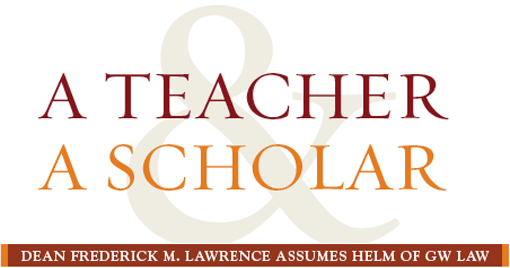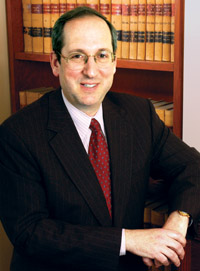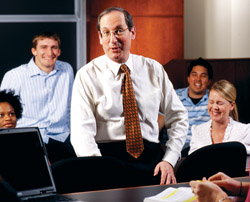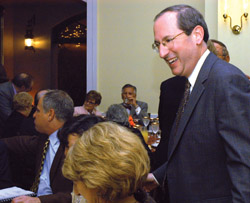|

By Jamie L. Freedman
A new era began at GW Law this August, when
internationally renowned civil rights scholar
Frederick M. Lawrence took over the reins of
the Law School as dean. One of the nation’s
leading experts on civil rights crimes, Lawrence
was chosen from a pool of more than 175
applicants following an extensive yearlong search.

|

Stan Barouh
|
Lawrence’s journey to law school dean
began early in life, when he became captivated
by both government and law. “Growing up,
it seemed to me that lawyers were disproportionately
involved in the most significant issues of the
day, from politics to the civil rights movement,” he
states. “I wanted to be part of that.” Academia
was a natural calling for Lawrence. “I
come from a long line of teachers,” he
says, noting that his mother taught high school
English for 40 years and that both of his paternal
grandparents were teachers. “I was very
much brought up thinking of teaching as a noble
profession.”
Born and bred in Port Washington, N.Y., on the
North Shore of Long Island, Lawrence earned a
bachelor’s degree in political economics
from Williams College and a JD from Yale Law
School. Law degree in hand, he landed a one-year
clerkship with Judge Amalya L. Kearse of the
U.S. Court of Appeals for the 2nd Circuit and
then served as a litigation associate at the
Manhattan law firm Kramer, Levin, Nessen, Kamin & Soll
(now Kramer, Levin, Naftalis & Frankel).
In 1983, he was named an assistant U. S. attorney
for the southern district of New York, rising
to chief of the civil rights unit. “My
boss was Rudolph Giuliani, who was then U.S.
attorney,” reflects Lawrence, who met with
Giuliani frequently and says that he was
“truly terrific.”
At the U.S. Attorney’s Office, Lawrence’s
interest in criminal civil rights law flourished,
ultimately inspiring him to specialize in the
field. “When I took over the civil rights
unit, I worked on a number of police and correctional
officer brutality cases, as well as racially
motivated criminal activity cases. I’d
never considered focusing my practice on criminal
civil rights law until that point, which is one
of the reasons I always advise my students not
to over plan their careers.” The dean adds: “I
just attended a convocation at Williams College,
where my daughter is a senior, and the guest
speaker advised students to ‘embrace serendipity.’ It
seems to be pretty good advice!”
Lawrence looks back fondly on his days as assistant
U.S. attorney. “It shaped who I am today
in a number of ways,” he states. “The
experience of serving the public is very powerful.
It certainly influenced me in my belief that
part of what you do in your career has to involve
public service.”
He reflects that the job also taught him the
importance of “thinking broadly about problems
and trying to come up with solutions that may
not be obvious at first.” One case in particular
sticks out in his mind. Lawrence explains: “I
was involved in an investigation surrounding
a test that police officers had to take to be
promoted to police sergeants. The test had a
discriminatory pass rate for blacks and Hispanics
verses whites. We helped bring together the city
and the societies representing the minority officers
by getting everybody to agree on who would develop
the new test. By getting maximum input at the
time the test was put together, which is something
that hadn’t been done before, we brought
people together while helping to find a viable
solution. The test wasn’t challenged again
during my tenure there.”
Academia then beckoned and Lawrence answered
the call, accepting a position on the faculty
of Boston University School of Law in 1988. “I’d
been thinking about teaching for a long time,
and, after five years at the U.S. Attorney’s
Office, it was decision-making time,” he
reflects. “As much as I loved the trial
and investigatory work of the job, what I found
most rewarding was pondering the hard decisions
and finding out what solutions made sense, and
that’s what academics do.”
Lawrence quickly made a name for himself at Boston
University, teaching courses in civil rights
enforcement, civil rights crimes, civil procedure,
and criminal law, and receiving the institution’s
Metcalf Award for Excellence in Teaching, the
highest of the university’s teaching honors.
After completing a stint as BU’s associate
dean for academic affairs from 1996 to 1999,
Lawrence returned to the classroom in 2000 as
a Law Alumni Scholar, a prestigious endowed chair.
A prolific writer, Lawrence is the author of
numerous articles, book chapters, and the widely
acclaimed Punishing Hate:
Bias Crimes Under American Law (Harvard University Press, 1999), and lectures
extensively nationally and internationally about
bias crime law. He has testified before Congress
in support of federal hate crimes legislation,
and, last year, was a member of the American
delegation to the meeting of the Organization
of Security and Cooperation in Europe on Enactment
and Enforcement of Legislation to Combat Hate-Motivated
Crimes.

“One of the best ways to get to know a large number of students in a deep
and sustained way is by interacting with them in the classroom.” —Dean
Frederick M. Lawrence
William K. Geiger
|

|
A passionate teaching dean, Lawrence has long
valued the importance of getting to know his
students. “One of the best ways to get
to know a large number of students in a deep
and sustained way is by interacting with them
in the classroom,” says Lawrence, who is
currently teaching first-year criminal law at
GW. “It’s important to illustrate
that as vital as scholarship and expanding the
faculty endowment are, the core enterprise of
a law school is teaching and training young lawyers.
As dean, I feel that it’s important to
act upon that.”
Lawrence is impressed by the quality of students
at GW Law. “GW students are well prepared
and very intellectually engaged and I’m
enjoying teaching them very much,” he says. “Broadly,
they are a very upbeat, welcoming group, who
were extra welcoming to the 14 students from
New Orleans law schools who arrived at GW two
weeks into the semester in the wake of Hurricane
Katrina. It’s great working with them.”
Teaching, he admits, also provides him with a
much-needed sanctuary. “There are some
days that I know the only hour of the day that
there will be no interruptions, meetings, and
phone calls is when I’m in class, and that’s
really a great privilege,” he says.
According to Lawrence, it’s imperative
for law schools to train young lawyers to be
careful and rigorous thinkers, have good judgment,
and be honest. “It continues to be a vital
function of law schools in America to train attorneys
with a deep and abiding sense of personal ethics,” he
states. “Just think about the Enron case.
How many times has a note or report been passed
on by some lawyer who should have said no and
didn’t?”
Lawrence is quick to state that GW Law’s
world-class teaching faculty does a masterful
job. “We have a very well-known, scholarly
faculty who, at the same time, are dedicated
teachers, which is very important to me,” he
says. “I am honored to join this group
of distinguished and highly accomplished scholars,
who, through their books and articles, TV appearances,
and conference presentations, are influencing
other scholars and decision-making at all levels
of government and around the world on a whole
host of pressing legal issues.”
GW Law School, he says, is on “very much
of an upward trajectory, which can be measured
by the quality of the faculty and student body,
our extraordinary alumni base who’ve gone
on to all sorts of wonderful things in law and
other fields, the physical plant, which has improved
so much in recent years, and the U.S.
News, where
we recently ranked 20th out of some 190 law schools
nationwide.”
He hopes to strengthen the mix further by helping
to expand faculty endowment and increasing scholarship
funds for students at GW. “By expanding
faculty endowment, we’ll continue to retain
and attract the kind of quality faculty that
keep us on top,” he states. Stressing the
importance of scholarships, Lawrence says, “We
want to see any student who qualifies for admission
to our law school be able to attend here regardless
of their financial situation. Money should not
be an impediment.”

|

Lawrence greets
visitors Oct. 22 at a dinner in honor
of the Law School’s reunion classes.
Claire Duggan
|
As he begins
to make his personal imprint on GW Law, Lawrence
says one of his top goals is to build upon the
positive relationships already in place at the
Law School.“I believe strongly in cultivating an open,
optimistic, forward-looking, cooperative, collegial
atmosphere,” he states. “People ought
to feel good about coming to work and students
to school every day, and if we’re really
doing our job right, after graduation, our students
will look back upon GW Law as a place of clarity
in a world that all too often lacks clarity in
their professional lives.”
Describing himself as a “transparent leader,” he
says, “I like for people to know what I’m
thinking. They may not always agree with what
I think, but I hope they feel they can always
bring their concerns to me and that I hear what
they say.”
A man of many talents, Lawrence says that before
he got “so busy with his day job,” he
enjoyed singing with the New York Choral Society,
performing at top venues like Carnegie Hall,
Lincoln Center, and the John F. Kennedy Center
for the Performing Arts. “One of my biggest
highlights was singing with Peter, Paul, and
Mary, who were just as nice in person as you’d
imagine them to be,” he reflects. The dean’s
other hobbies include reading, hiking, and jogging.
Additionally, since 2003, he has chaired the
National Legal Affairs Committee of the Anti-Defamation
League.
On the home front, Lawrence and his wife, Kathy,
celebrated their 25th wedding anniversary this
past summer. Kathy, who has a PhD in American
Studies from Boston University, is now an adjunct
faculty member at GW, where she teaches Introduction
to American Literature and a graduate level course
in art history. Their daughter, Miriam, is a
senior majoring in English at Williams College
and son Noah is a freshman at Yale.
As Lawrence begins this exciting new chapter
in his career, he is keenly aware of the power
of synergy. “I always tell my students
that none of us is as smart as all of us, and
boy is that true of the dean!” he exclaims. “I’m
lucky to have a great faculty, staff, and students
here at GW, and by working together and hearing
each others’ ideas, we will reach greater
and greater heights in the years ahead.”
|